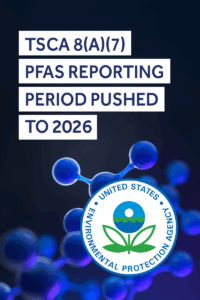U.S. Toxic Substances Control Act (TSCA)
May 29, 2025 | Written by GreenSoft Technology, Inc.
PFAS Reporting Period Under U.S. Toxic Substances Control Act (TSCA) Delayed Until 2026
EPA delays reporting period for PFAS chemicals under TSCA Section 8(a)(7) until July 2025
On May 13, 2025, the United States Environmental Protection Agency (EPA) announced the delay of the start of the reporting period for Reporting and Recordkeeping Requirements for Perfluoroalkyl and Polyfluoroalkyl Substances (PFAS), under Section 8(a)(7) of the Toxic Substances Control Act (TSCA).
The reporting period was originally scheduled to begin in November of 2024 before being delayed to July 2025. The EPA’s new interim final rule delays the start of the reporting period by nine additional months to April 13, 2026.
The reason for the extension is to allow more time for the EPA to further test and develop the software being used to collect the required data from manufacturers.
Under the interim final rule, the data submission period will open on April 13, 2026, when the agency expects the software reporting application to be fully functional. Most reporters will be required to complete all reporting by October 13, 2026. Small businesses reporting data solely on importing PFAS contained in articles will have until April 13, 2027 to submit reports.
Public comment period now open for TSCA PFAS reporting period delay
The EPA will be accepting public comments on the reporting period change for 30 days. Comments on the interim final rule may be submitted here.
The EPA has also announced they are considering holding an additional public comment period for “other aspects” of this rule. There is good reason to believe this additional comment period will be for the EPA to consider exempting article importers and small producers from the PFAS Reporting Rule altogether.
A recent press release from the EPA published on April 28 stated that they intend to “implement section 8(a)7 to smartly collect necessary information, as Congress envisioned and consistent with TSCA, without overburdening small businesses and article importers." This appears to hint at the possibility of exempting article importers from TSCA Section 8(a)(7).
The dates for this additional comment period have not been set, and the EPA plans to address feedback gathered from both comment periods concurrently.
Background on the TSCA Section 8(a)(7) reporting and recordkeeping requirements for PFAS
Under the TSCA Section 8(a)(7) reporting and recordkeeping requirements, any company that has manufactured or imported PFAS within the United States, or has imported PFAS-containing articles in any year between January 1, 2011 and December 31, 2022 are required to electronically report information regarding PFAS uses, production volumes, disposal, exposures, and hazards to the EPA.
The reporting rule is a statutory requirement established by the FY2020 National Defense Authorization Act. The purpose of the rule is to provide the EPA, its partners, and the public with the largest-ever dataset of PFAS manufactured and used in the United States, and is a key action in EPA’s PFAS Strategic Roadmap.
More information from the EPA on the rule can be found online. Additionally, GreenSoft Technology maintains a PFAS Resource Center with information on PFAS regulations and proposals around the globe, which can be found here.
GreenSoft helps identify PFAS chemicals in your supply chain for TSCA compliance
GreenSoft Technology’s PFAS Data Services solution provides affected companies with the chemical data from their supply chain that is needed to comply with the TSCA Section 8(a)(7) rule.
Our data collection team will contact your suppliers directly to obtain data on the PFAS chemicals contained in your products and components as per the PFAS definition noted in TSCA Section 8(a)(7).
With our Turnkey Service, we can generate the necessary compliance reports for you. Or you can use our GreenData Manager software to manage your company’s substance database and easily generate reports for this and other environmental regulations. Contact us to learn more.


